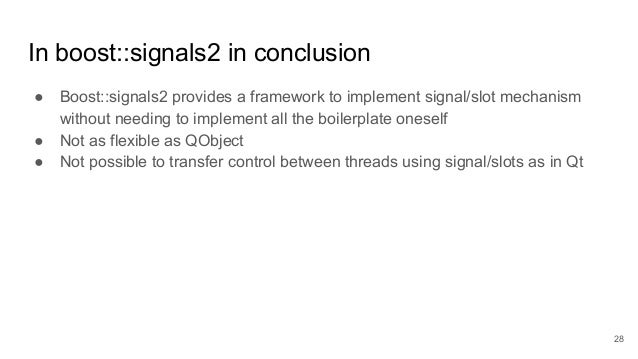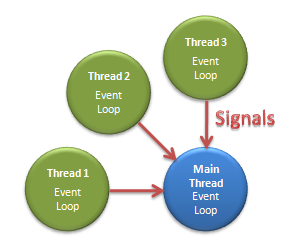Qt Signal Slot Not Called
The receivers of signals are called Slots in Qt terminology. A number of standard slots are provided on Qt classes to allow you to wire together different parts of your application. However, you can also use any Python function as a slot, and therefore receive the message yourself. Abstract: A fundamental property of the Qt framework is the so called signals and slot mechanism. It is a generic event mechanism which is easy to use. By providing an interface of provided events. The Qt::QueuedConnection will ensure that the Slot is called in the thread of the corresponding QObject. It uses the fact, that every thread in Qt (QThread) has a Event-queue by default. So if you call the Signal of the QObject the method generated by Qt will enqueue the command to call the Slot in the Event-queue of the other QObjects thread. I found out today that Qt’s slots/signals architecture is even better than I thought. Normally, developers connect widget signals to widget slots to be notified of events. Today I discovered that signals can actually be connected to other signals, which saved me from writing some really stupid code This may seem weird, but consider this. Slot on main thread not called when signal is emitted from another thread Paul Offord (Dec 15) Re: Slot on main thread not called when signal is emitted from another thread Gerald Combs (Dec 15) Re: Slot on main thread not called when signal is emitted from another thread Paul Offord (Dec 16).
When we change a widget in GUI programming, we often want another widget to be notified. More generally, we want objects of any kind to be able to communicate with one another. For instance, if a user clicks a Close button, we probably want the window's close() function to be called. Signals and slots are Qt Jambi's mechanism for such communication between objects.
In this overview, we will examine how to implement and use signals and slots in Qt Jambi. We look at how the mechanism works, its intended usage, and give an example.
Qt Signal Slot Not Called Two
Signal and Slots
A signal is emitted when a particular event occurs. Qt Jambi's widgets have many predefined signals, but we can always subclass widgets to add our own signals to them. A slot is a method that is called in response to a particular signal. Qt's widgets have many pre-defined slots, but it is common practice to subclass widgets and add your own slots so that you can handle the signals that you are interested in.


The signals and slots mechanism is type safe: The signature of a signal must match the signature of the receiving slot. Signals and slots are loosely coupled: A class which emits a signal neither knows nor cares which slots receive the signal. Qt Jambis's signals and slots mechanism ensures that if you connect a signal to a slot, the slot will be called with the signal's parameters at the right time.
All classes that inherit from QSignalEmitter - which is an ancestor of all Qt Jambi classes - or one of its subclasses (e.g., QWidget) can contain signals and slots. Signals are emitted by objects when they change their state in a way that may be interesting to other objects. This is all the object does to communicate. It does not know or care whether anything is receiving the signals it emits. This is true information encapsulation, and ensures that the object can be used as a software component.
All normal member methods can be used as slots, so there are no specific requirements for a method to function as a slot. Just as an object does not know if anything receives its signals, a slot does not know if it has any signals connected to it. This ensures that truly independent components can be created with Qt Jambi.
You can connect as many signals as you want to a single slot, and a signal can be connected to as many slots as you need. It is even possible to connect a signal directly to another signal. (This will emit the second signal immediately whenever the first is emitted.)
Together, signals and slots make up a powerful component programming mechanism.
An Example
A minimal Java class using signals and slots may read: The class manages a counter, which is stored in the private member value. The signal valueChanged is emitted whenever value changes. We will now go through the class step-by-step to describe how signals are created and emitted. Signals in Qt Jambi are implemented in classes named Signal1, Signal2 to Signal9. The number of the class indicates the number of parameters the signal has. The type of each parameter is specified as a generic. It is customary to declare signals as public rather than to provide access methods for them. The getter for value is annotated with @QtBlockedSlot. This prevents the method from being used as a slot. The annotation is mostly provided for consitency with Qt, in which functions must explicitly be declared as slots. To emit a signal, you simply invoke its emit method with the necessary parameters (all signal classes implements an emit method). The signal will then invoke the slots and other signals it is connected to.
Note that the signal is only emitted if val != value. This prevents infinite looping in the case of cyclic connections (e.g., if b.valueChanged() were connected to a.setValue()). We move on the see how signals are connected to slots. When you connect a signal to a slot, you specify the object that will receive the signal and the method signature of the slot. It is only the type of the method parameters that should be specified and not the parameter names.
Calling a.setValue(12) makes a emit a valueChanged(12) signal, which b will receive in its setValue() slot, i.e. b.setValue(12) is called. Then b emits the same valueChanged() signal, but since no slot has been connected to b's valueChanged() signal, the signal is ignored.
A signal is emitted for every connection you make; if you duplicate a connection, two signals will be emitted. You can always break a connection using the signal classes disconnect() method.
Signals
Signals are emitted by an object when its internal state has changed in some way that might be interesting to the object's client or owner. Only the class that defines a signal and its subclasses should emit the signal.When a signal is emitted, the slots connected to it are executed immediately, just like a normal method call. When this happens, the signals and slots mechanism is totally independent of any GUI event loop. Execution of the code following call to emit will occur once all slots have returned. The situation is slightly different when using queued connections; in such a case, the code following the call to the signals emit method will continue immediately, and the slots will be executed later.
If several slots are connected to one signal, the slots will be executed one after the other when the signal is emitted.
Slots
A slot is called when a signal connected to it is emitted. Slots are normal Java methods and can be invoked normally; when we talk about a slot, we simply mean a method that happens to be used as a slot.Since slots are normal member methods, they follow the normal Java rules when called directly. However, as slots, they can be invoked by any component, regardless of its access level, via a signal-slot connection. This means that a signal emitted from an instance of an arbitrary class can cause a private slot to be invoked in an instance of an unrelated class.
| Copyright © 2009 Nokia Corporation and/or its subsidiary(-ies) | Trademarks |
Example
Some times you see a signal is emitted in sender thread but connected slot doesn't called (in other words it doesn't receive signal), you have asked about it and finaly got that the connection type Qt::DirectConnection would fix it, so the problem found and everything is ok.
But generaly this is bad idea to use Qt:DirectConnection until you really know what is this and there is no other way. Lets explain it more, Each thread created by Qt (including main thread and new threads created by QThread) have Event loop, the event loop is responsible for receiving signals and call aproporiate slots in its thread. Generaly executing a blocking operation inside an slot is bad practice, because it blocks the event loop of that threads so no other slots would be called.
If you block an event loop (by making very time consuming or blocking operation) you will not receive events on that thread until the event loop will be unblocked. If the blocking operation, blocks the event loop forever (such as busy while), the slots could never be called.
In this situation you may set the connection type in connect to Qt::DirectConnection, now the slots will be called even the event loop is blocked. so how this could make broke everything? In Qt::DirectConnection Slots will be called in emiter threads, and not receiver threads and it can broke data synchronizations and ran into other problems. So never use Qt::DirectConnection unless you know what are you doing. If your problem will be solved by using Qt::DirectConnection, you have to carefull and look at your code and finding out why your event loop is blocked. Its not a good idea to block the event loop and its not recomended in Qt.
Qt Signal Slot Not Called The Day

Here is small example which shows the problem, as you can see the nonBlockingSlot would be called even the blockingSlot blocked event loop with while(1) which indicates bad coding